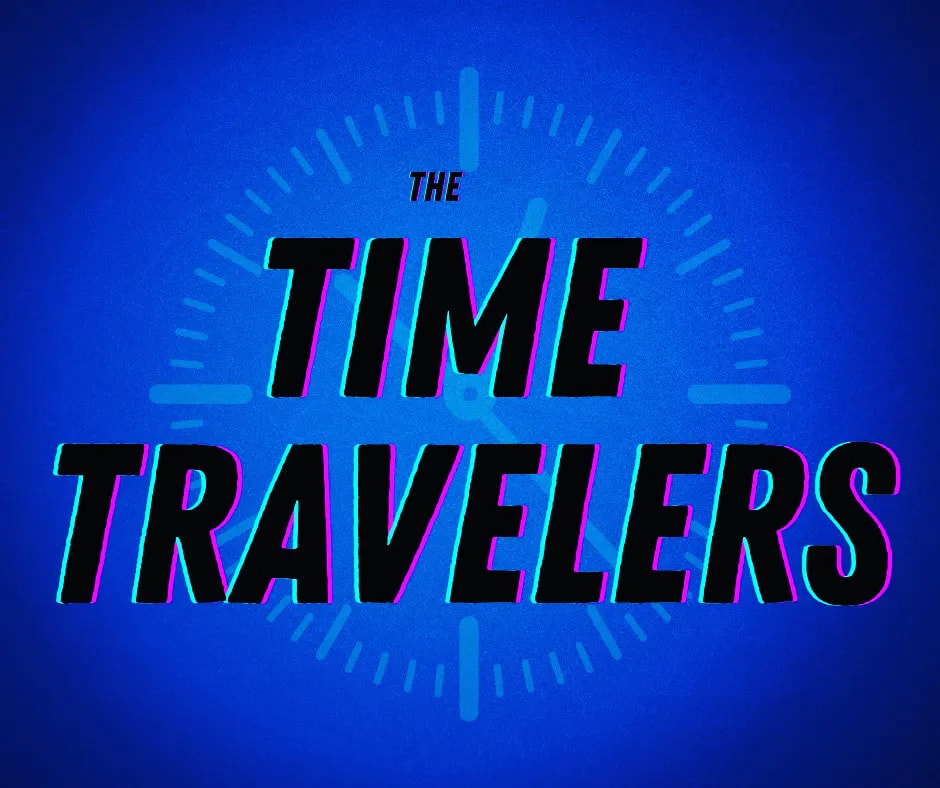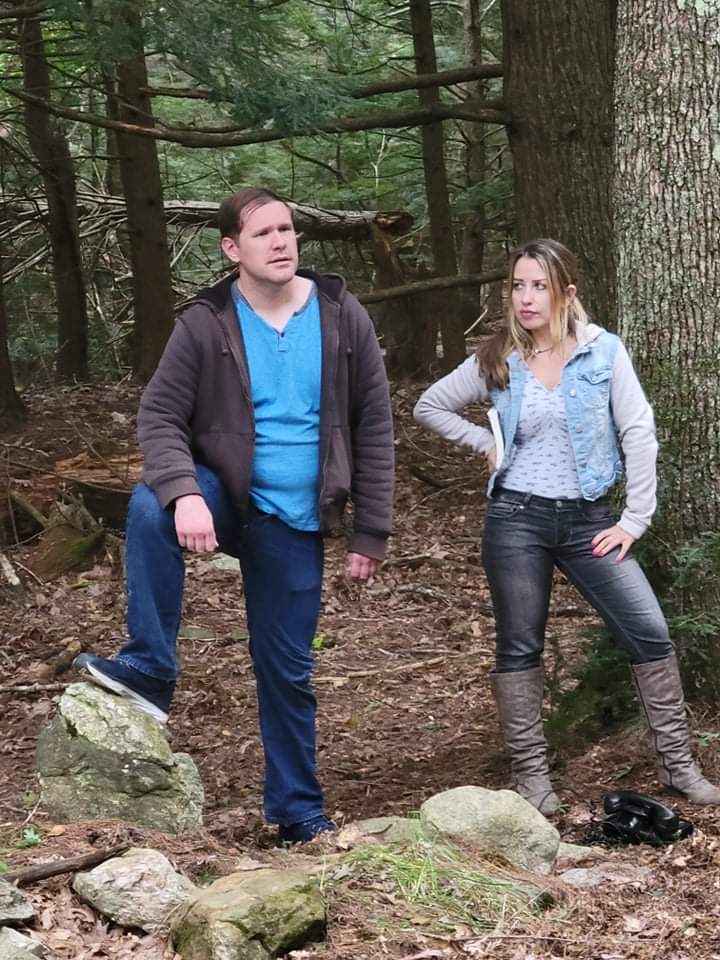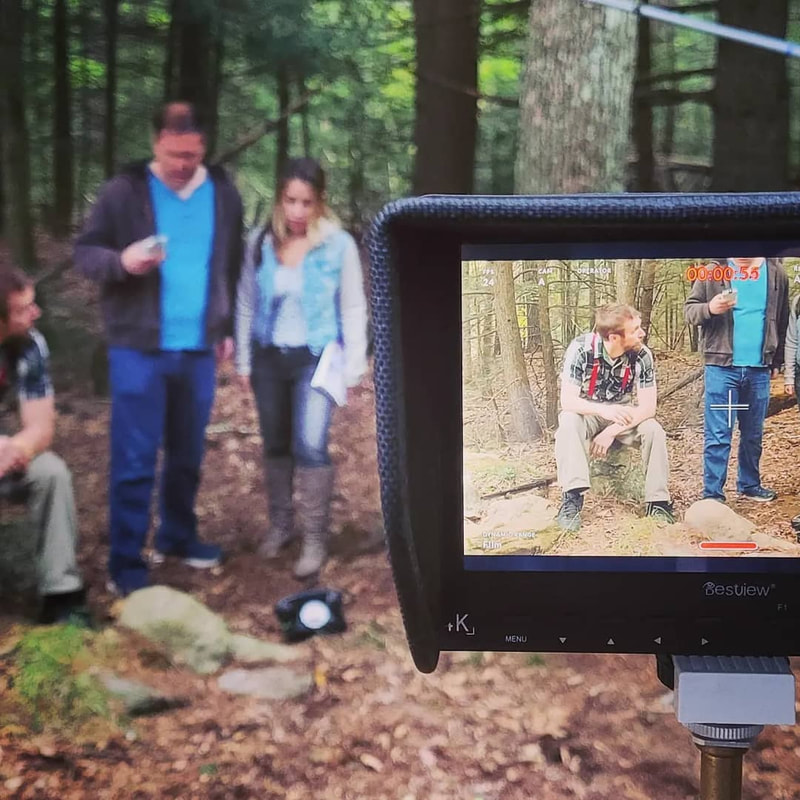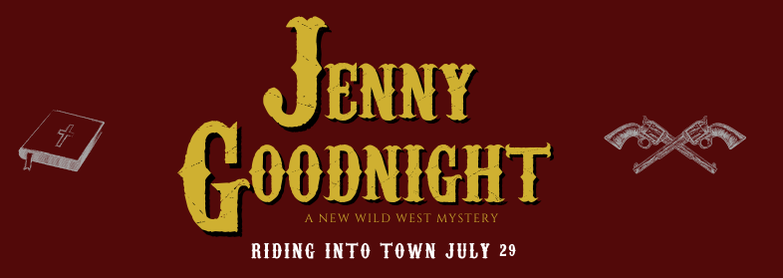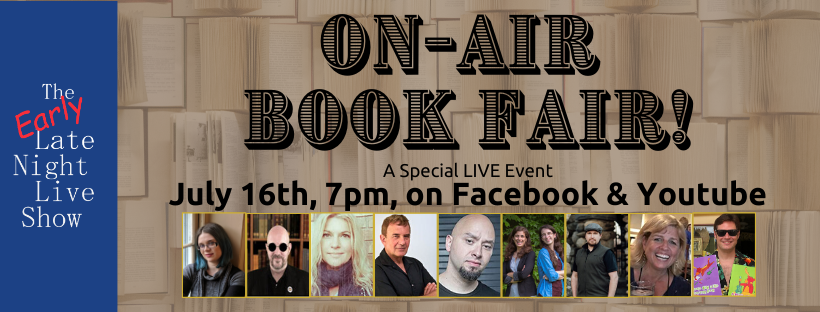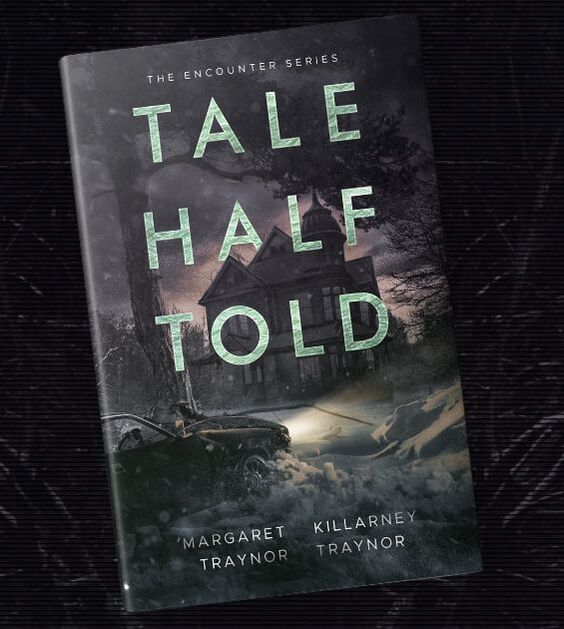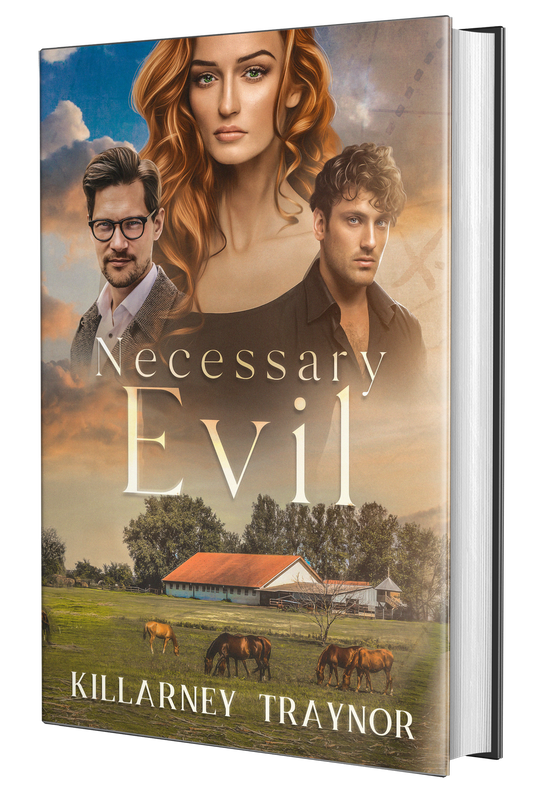|
If you're anything like me, you love to read - but things like housework, work-work, and life get in the way. Which is why I LOVE audiobooks, especially free audiobooks (my wallet appreciates the break!). And with Halloween right around the corner, I thought I'd share my latest YouTube obsession: Classic Ghost Stories Podcast is just that - a podcast devoted to classic ghost and spooky stories, from Shirley Jackson to Bram Stoker and a whole host of short stories and spooky tales that I never would have found on my own. Tony Walker has a terrific British accent (gotta love that!) and a great reading voice - you'll be lulled into a false sense of security listening to him. And stay tuned after the stories are finished; often, he gives a little analysis or his own perspective on the story just read. So if you're in the mood for spooky stories and you've got a bit of a drive or a long day of tasks in front of you, check this podcast out. It'll put you in the Halloween mood. Thus far, my top two videos are "The Haunting of Hill House" (above) and "The Birds" (below). Note of caution - do NOT listen to "The Birds" when you're driving alone through deserted countryside at night! (I tried it - it's a trip.) Enjoy!
0 Comments
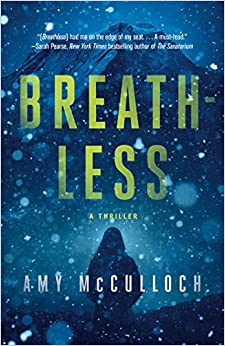 Synopsis: Journalist Cecily Wong has a bad track record when it comes to mountaineering. But when charismatic and internationally famous mountaineer Charles McVeigh invites her to join his record-breaking final climb of the year on Manaslu, she knows its a potentially career-making opportunity. The only catch? No interview until she summits. Putting her past failures behind her, Cecily joins the team. But when a climber dies under mysterious circumstances, she becomes suspicious. By the time the second climber dies, it's too late to back out now. Stuck in a mountain death zone , she has to battle her own self doubt, the elements... and a killer who is determined to leave no witness to tell the tale. Breathless is both a survival story and a murder mystery and it literally gave me the chills. Cecily is an every woman, suddenly thrust, relatively unprepared, into the privileged, pricey, and competitive world of mountaineering, a world were death is not unusual and the biggest obstacle is not necessarily the climb. As Cecily prepares to tackle Manaslu, she also begins to learn about the people on her team and the various reasons why they climb. It's an insider's look into a club that I, frankly, had never thought to even try to join.
McCulloch's descriptions of the climb, the cold, the dangers, and the heights were bone-chillingly realistic. When one of the characters nearly falls through a crevasse, I found myself shouting aloud a warn. Honestly, I didn't know that my fear of heights could be triggered by a book. Turns out, it can. While the mystery itself is solved fairly easily (someday I'm going to write a book of rules for the amateur sleuth!), the book is still intense because of the duel nature of the threat - the human and the mountain. This book was gripping and terrifying. I highly, highly recommend it. Unless you're planning on tackling Everest. In which case, maybe wait until after the climb lest you psych yourself out. 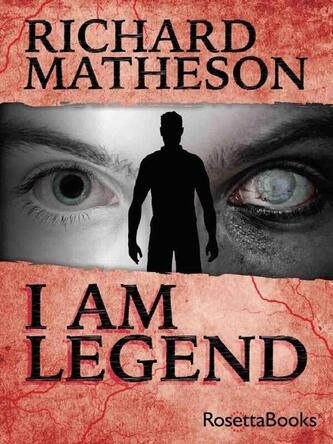 Synopsis: Robert Neville is the last human on earth. Or might be. He doesn't really know. What he does know is that a devastating virus has swept through the world, turning the inhabitants into vampires. Now Robert is alone, held up in a bunker that once was his home, king of all he surveys by day, trapped and surrounded by rapacious vampires by night. Can one man survive in a world of vampires? Legend flips the traditional vampire story on it's head by putting vampires in the majority, with an outclassed humanity on the run. Neville is a man who has lost everything: his work, his wife, his child, his whole world. By day, he can sally forth outside of his house, looking for food and supplies, but every night, he is besieged by vampires literally starving for his blood, perhaps the last truly human blood on the planet. It's dark, it's claustrophobic, and, in a post-Covid pandemic world, this story strikes a little too close to home (but in the best way). Oddly, this story didn't hit me as hard as Matheson's other fiendishly frightening book, Hell House. Perhaps, having lived through multiple lockdowns, I've become accustomed to the terror of it. And although Matheson does occasionally fall prey to certain story-telling tropes of the time (it AMAZING how many horny, well-endowed, under-clothed women survive the various holocausts, plagues, invasions, and disasters in the sci-fi worlds of the 1950s and 1960s - and how often they need the love of a good(read: available) man in the midst of said crisis #eyeroll), it actually works with the story here. The story is succinct, bloody, and well-reasoned, as well as a fascinating look at a man, struggling with loneliness, loss, and a world without meaning. It is not for the faint of heart. I Am Legend is well worth the read for lovers of horror and sci-fi. (However, I would caution against reading it while in quarantine. ;) )  Synopsis: In a sleepy English village in the 1950s, a housekeeper dies. But was her death an accident? Or murder? Atticus Pund, a holocaust survivor and famous private detective, has nothing to go on and his own problems to deal with: a terminal illness is threatening to take him before he can finish writing his book. But then housekeeper's employer, Sir Magnus Pie, is beheaded in his own mansion. Can Atticus solve one last murder before his own clock runs out? Meanwhile, in present day London, editor Susan Ryland receives the first draft of Alan Conway's latest Atticus Pund novel, she has no idea that her life is about to be flipped up-side-down. Not only is Alan about to kill off the most popular character in her publishing house's library, but the last chapter is missing - and Alan Conway is dead. Now she has to find the last chapter... and possibly solve a real live murder on her own. At long last, the Time Travelers have arrived! You can watch it on Rumble and on YouTube - when you do, be sure to leave a comment about what time period YOU would want to visit! Many thanks to everyone who worked on this film, including the fabulous cast and crew - visit the Time Travelers page for more information about all of them. We have more little films and books in the works, so stay on the look out for those! I am so excited to announce that my new short film, The Time Travelers, is on its way into post production!
This past Sunday, a small group of enthusiastic filmmakers, actors, extras, and behind the scenes geniuses gathered together to shoot a short film set in 9 time periods. It was a packed day, but a fun one and I can't wait to share the film with you. This film is the first of my solo production (with Book Sisters Productions able assistance)! Stay tuned! More fun is on the way! During the Covid 19 Pandemic, I've been lucky enough to have been able to work with Abbynormal Productions in a series of Facebook plays. As part of that, I got to work with the awesome Leila Toba on Dr. Jekyll and Mr. Hyde and Dracula (I got to respectively play two cool original characters, the indominable Sr. Agatha and quirky, flirty Bridget Stone, aka The Curator). Abbynormal is creating a new monsterverse, so if you're a horror fan and you haven't checked out their Facebook page, do yourself a favor and check it out here.
Leila and I were interviewed by Andrew Morris on his What the Niche podcast about being women in horror, why the horror genre is ultimately hopeful, and why Morticia Addams is Boss. (I also learned, on relistening, that I giggle a LOT!) Many thanks to Andrew and Leila for such a fun and informative chat! Check it out here - our interview starts at the 40 minute mark! Being the organized mess that I normally am, I totally spaced (see what I did there?) that Universal Threat is free on Amazon this week! Be sure to check it out here! Also, check out the trailer below! Looking for a haunted read for Halloween? Look no further!Many thanks to Diane Donovan of Midwest Book Review for this awesome write-up! (Check out the review on their website here. You'll have to scroll a bit!) 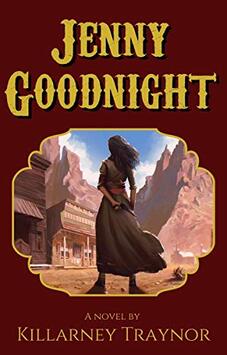 Jenny Goodnight Killarney Traynor Original Thirteen Publications www.killarneytraynor.com Review by Diane Donovan for Midwest Book Review. Jenny Goodnight tells of a tired missionary woman who becomes drawn into a town conflict between fiery newspaper reporter Uncle Matthew and the powerful founding family of the town of Legacy. It doesn't help her case, when murder results, that she's an assertive woman known for packing a pistol and confronting violence, herself. When she becomes a suspect in the murder, Jenny is drawn into the investigation to save herself from hanging. Like her investigative uncle, she discovers even more layers to the town's politics and underlying connections, the more she pulls at the strings of possibilities and strange associations. Killarney Traynor creates an involving, clever, assertive protagonist in the character of Jenny Goodnight. The plot follows her special form of frontier justice and confrontation beyond the confines of the usual Western female protagonist. Jenny's uncle wants to reject her inclination to rescue him even as she uncovers truths about his relationship with Underwood and the secret that is being held over his head. More importantly, Jenny herself finds that her own future and capacity to survive and live in this town depends on her ability to unravel a very strange and deadly truth indeed. From a missing letter to another act of violence that hits too close to home, Jenny perseveres against all odds, drawing readers into a Western scenario in which her strengths spill over into other lives to create new possibilities not just for Jenny, but those around her. Another big plus to the story is the atmospheric descriptions that create strong images of countryside and purposes: "I followed him down the narrow path. The sun was descending, shafts of light gilding the rugged dark pines and bringing out the burnt orange of the landscape. We rode maybe half a mile under the arbor, then the trees gave way and the valley opened up before us. A low, squat building, weather-beaten and in need of work, was situated on the open plain, a barn just behind it. Beyond these, a creek wended its way through a corridor of earth-clutching trees. There were more trees staked out in an irregular pattern on the far side of the house. Cattle lowed from somewhere, and Danaher's nag whinnied in the paddock. It was a sweet piece of land, capable of supporting a small family, and I wondered if that would have suited the lovely Helen, had she not caught the eye of an Evans." Readers who like blends of Western and mystery themes, powered by an exceptionally astute female protagonist, will relish the intrigue, atmosphere, and confrontational changes in Jenny Goodnight, which is highly recommended reading for Western novel fans looking for more than the usual male-centric focus. Order Jennry Goodnight on Amazon.com or here on my website!
In this sneak peek from Jenny Goodnight, Jenny, a burnt-out missionary, has just arrived in the small town of Legacy, where her Uncle Matthew has started a small but controversial newspaper. As Jenny waits in her uncle's print shop to greet her uncle for the first time in a long while, something happens to disturb the peaceable reunion: 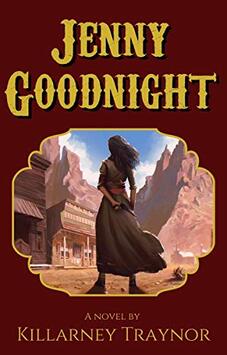 How long I waited, I can’t say. Time stretched out until I lost track of it. My head grew lighter until it seemed ready to float away. My legs were heavy, like blocks of wood, and there was a general fogginess about my ears that blurred what few sounds there were. I was slipping away again – dreams beckoned with dark arms. Then, just I was on the verge of falling asleep properly, an explosion occurred. I exaggerate, of course. It was merely the front door bursting open under someone’s impatient shove – but it might as well have been an explosion from the way it made my heart skip a beat and shook me out of my reverie. The door slammed back against the wall, making the windows rattle. A big, bulky man stormed past me. His boots hit the floorboards like weights, and when he slammed his large fist down on the counter, everything on it shook and danced the jig. “Goodnight!” the man roared. “Goodnight, where are you?” I caught my breath. The man’s voice was as big as his presence. He was dressed in the usual cowboy gear – blue jeans, a faded button down, boots curiously spur-less, and a hat which he pulled off to reveal a head full of dark hair. He was coated in dust and grime and might have been just any no-account worker, except for his good quality leather vest and the hand-tooled leather belt carrying his six-gun – both too expensive for the ordinary ranch hand. I jumped when his fist struck the counter again. “Dammit, Goodnight, don’t make me come in there after you!” He tossed his hat on to the counter, freeing his gun hand. It was then that I saw the newspaper, clutched tight in his fist. The white knuckle grasp on the newspaper, the rigid clench of his jaw, and the tension of his big shoulders radiated not only outrage, but the ability to act on it. This was a very dangerous man. Slowly, lest he catch sight of me, I bent down towards my carpet bag. “John Henry!” The call came, not from my uncle’s office, but from the open doorway behind me. A slim man stood there, also dusty and breathing heavily. The big man at the counter whirled around and pointed at the new figure. “Stay out of this, Olsen,” he threatened. He saw me then and I froze, bent at the waist over my carpetbag. His eyes raked over me, a brief but penetrating evaluation. Then he looked back at Olsen. “I’m just going to have a friendly chat with Mister Newspaperman here.” He turned and pounded the counter once more. “Goodnight!” “This ain’t no way to do it,” Olsen said. He pushed the hat back from his sun-weathered face and stepped cautiously into the room. “Let Schuyler handle it – that’s what you pay him for.” That only seemed to enrage the big man more. He slammed his palm into the counter (I was surprised that the board withstood such punishment) and roared, “This is a family matter and I’m not paying any lawyer to do what I can do myself. Goodnight, are you coming out here or am I coming in there?” I fumbled with the catch on the carpetbag. Then the office door opened and Matthew Goodnight emerged. A decade had passed since I had seen my uncle, but I would have known him anywhere. The fearless smile, the sharp blue eyes, the almost military carriage were all so reminiscent of my father that, under other circumstances, I might have had a misty moment. But Uncle Matthew was not my father and he had changed with the passage of time. Though his good looks remained, his features had softened and his face showed shades of cream and pink beneath the ever-present tan. There was something disheveled about his person, as though he no longer cared so much for appearances. He and my father shared the same feckless courage in the face of danger and he displayed it now, stepping out of his office as casually as if this were a social call. “Ah,” he said, carefully shutting the office door behind him. “Mr. Evans – to what do I owe the pleasure?” Evans? I did a double take. So the big man beating the counter was John Henry Evans, a member of the Evans clan I’d heard so much about. It explained the swagger, Olsen’s deferential manner, and Evans’s air of outraged dignity. It was his brother, Ben, who was running for office and it was their mother who was running the campaign. His family had founded this town and they weren’t accustomed to be being argued with or challenged. They were, in short, precisely the kind of people most likely to provoke my uncle’s ire. “You know what a firebrand crusader your uncle can be…” Aunt Alice always said that Uncle Matthew had the looks of a politician and the manner of an Irish pugilist with a sense of justice that would have impressed Solomon himself. It looked as though that moral courage was about to be reckoned with. Matthew Goodnight didn’t act like a man afraid. His voice was the same as I remembered from childhood – a blend of formality and superiority – and he smiled up at the big man as though he wasn’t concerned in the least. It was not calculated to be conciliatory and it had the expected effect. The big man slapped the newspaper down on the counter with such force that even Uncle Matthew jumped and Olsen took a half step forward. Evans pointed at the open page. “What do you mean by this, Goodnight?” he demanded, through gritted teeth. Uncle Matthew leaned over to look. “That,” he said, “is an editorial, an opinion piece. It is common in all papers, and it is usually meant to stir thought and to comment on recent events.” He flicked some dust from his jacket. “It’s a pack of lies, is what it is,” Evans said. “You came just short of calling my father a murderer!” Olsen took another cautious step forward. Uncle Matthew grinned. “I stopped short enough so that you won’t have a case if you try to sue this paper for libel. Not that you would or could, anyhow. Neither you nor your mother or your brother or his pretty little wife want to risk any of this going to court, do you?” He had barely finished when Evans grasped him by the shirtfront and drew him half-way across the counter until they were nose to nose. Olsen squawked, but didn’t try to interfere. I gasped and rose before I remembered what I was doing. “Now, you listen here.” Evans’ voice was low and dangerous. “You leave my mother and brother alone. If you’ve got a problem with the Evans family, you go through the court system, when and if you ever get the evidence. Do you understand me, Goodnight?” Matthew was as helpless as a rag doll in his grasp, but he eyed the big man with a steely gaze. “You couldn’t be more clear, Evans,” he said. Evans dropped him. Uncle Matthew recovered quickly, straightening his shirt front. Olsen relaxed, until Evans asked, “You’ll print a retraction, then?” Uncle Matthew laughed. “Retraction? You listen here, Evans, this paper doesn’t apologize for its opinions. We apologize for errors in facts, but never for our interpretation of them. No one asked your brother to make this foolish attempt at public office and someone should have warned him that all candidates are subject to scrutiny. If the precious Evans name doesn’t hold up under it, that’s not my fault. Tell your mother, the grand lady herself, to keep a tighter leash on Ben – better yet, make him drop this whole run.” “Not on your life,” Evans said. “The Evans family has nothing to be ashamed of, Benjamin the least of all.” “Oh, he’s too young to have done too much harm,” Uncle Matthew agreed. “But you might want to warn your mother that all good investigative reporters dig into the backgrounds of candidates and their families. I’m famous for my excavations, you know. The skeletons in your family closet had better be buried pretty deep if you don’t want me to find them.” “You’re a damned fool, Goodnight,” Evans said. His hands were balled into fists, his knuckles white under the pressure. “I’m just repeating what everyone else is already thinking. Twenty-two years ago, your father, Jacob Evans, and Ezra Jones, his partner, rode into this valley to look for gold. Five months into the search, up in the hills, Jones was bitten by a snake and your father was just a little too slow getting him to the doc – something about his horse stumbling and dying on the way. A month later, he finds ore in those same hills and is suddenly the biggest man this side of the Mississippi. And he doesn’t have to share it with anybody. All I’m suggesting here,” he laid his hand on the offending paper, “is that it was awful lucky for your old man: that snake bite and that accident with the horse.” Olsen whistled and half turned. My hand found what it was looking for. Buried under layer of calico, the smooth heft of the pistol grip filled me with reassurance and a trickle of fear. I always kept my revolver loaded with one empty chamber so it wouldn’t go off by accident. Wrapping my hand around it, I pulled myself back into an upright position, careful to keep my hands hidden in my skirts. Evans put both hands on the counter and leaned in. “You’ve got an accusation to make, newspaperman?” he asked. His voice was low, slow, and dangerous, and my pulse jumped. “Why don’t you just make it to my face and quit hiding behind that paper of yours?” “I’m just asking questions, John Henry…” “You call me Evans, Goodnight. Mister Evans.” “…and I’m not the only one who’s asking these questions.” Uncle Matthew leaned forward and even from that distance, I could see the dangerous glitter in his eyes. My hands began to sweat, slicking up the grip. My uncle said, “Now, folks around here have been asking a very logical question: Was it just luck that caused that snake bite and that horse to stumble? Maybe it was. But if you, the great John Henry Evans of the Evans Empire, are so sure this is the truth, why would a little thing like this opinion piece bother you, eh? If your father was the man you claim he is, if there isn’t a shadow of a doubt that he did all he could to get his partner to the doctor, that he had no idea of the ore up in those hills, if this was just one huge lucky break, why would you take time out of your busy day to come down here and threaten me?” “Goodnight, I’m a patient man…” Evans said warningly, but Uncle Matthew didn’t let him finish – he just leaned in further. “The only reason I can think of, John Henry, is that you yourself aren’t all that sure. You have doubts too. Did the horse really die of an accident? Was Jones even bitten in the first place? Or did your father decide that he didn’t want to share the ore up in those hills, so he killed his partner to keep it all for himself? Does your mother know-?” He never finished the sentence. Evans’ fist flashed and Uncle Matthew’s head snapped back with a sickening crack. Olsen cried out and jumped forward as the newspaperman dropped behind the counter. Evans was half-way across the counter when I found my feet and made my voice ring out across the room. “Now, you just hold it right there, Mr. Evans.” I doubt he would have stopped had I not accompanied my words with the ominous sound of the hammer of a Remington New Model Army .44 being drawn back... Order Jenny Goodnight Now!Bridie Vail agreed to allow me to use her in this short introduction. I've always loved reading about the Revolutionary War and since Miss Vail is the person I know who most closely reminds me of Maureen O'Hara, it seemed natural to set her story here. My apologies for any historical inaccuracies! Enjoy and happy Fourth of the July! 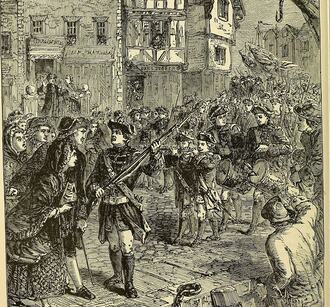 The occupation of Boston and the closing of the port had been done in a gentlemanly and efficient manner. The locals, clearly resentful, were for the moment keeping their distance. The other officers in Townhend's circle were hopeful that this would be an easy assignment, with nothing much more to do than drill the troops, collect their pay, and enjoy themselves. But though initially events seemed to confirm their optimistic outlook, Captain Townshend couldn’t shake the feeling that things were not as secure and calm as they appeared. Perhaps it was the weather, which was foggy and cold. Perhaps it was the miserable city of Boston itself, with its filthy crooked streets, dreadful little houses, and lack of anything even remotely resembling culture, cultivated minds, or art. Perhaps it was in the very silence of the inhabitants, who appeared watchful and calculating, even for disgruntled, ungrateful colonials. It might have been any one of those factors. But the truth of the matter was, it was something else entirely that kept him worrying. The Quartering Act was, of all the acts, perhaps the one most keenly resented by the colonists and no one could be more resentful than the Vails of Blank Street, where Captain Townshend had taken up his residence. Townshend prided himself of his good manners and clean living, on making himself the least possible bother to his reluctant landlords, but this made not one whit of difference to the Vails. They were Irish, of course. (It seemed that the entire nation consisted entirely of either disgruntled Irishmen or self-important Puritans, neither of which were particularly endearing.) The husband had worked on the sea, the wife was seamstress, and there were two sons who’d left before the occupation. The husband and the wife were quiet and Townshend could have left them well enough alone. But it was their daughter, a young, slender woman with stick straight hair and a proud carriage that would have cowed the Duchess of Marlborough, that really got under his skin. From a brief glance, Bridie Vail would not have seemed a rebel. She was generally demur, lady-like, even gentle. But prick her and she bled the colonist’s cause. Townshend had been in the house all of ten minutes before he realized this. He’d been gently but firmly introducing himself to the family, explaining the law and their duties to it and the crown. Mr. and Mrs. Vail had subsided into the resentful silence that he’d come to expect from these unreasonable Bostonians. “We expect that every subject will do his duty, as due his sovereign lord,” he said, finishing the little speech he crafted for all such occasions. It was Bridie who answered. “And I suppose you’ll be wanting meals, too.” He was a little surprised. She’d been silent until now and her voice was as gentle and soft as her appearance. He should have known it was misleading. “Yes,” he said. “That’s generally expected.” “ I see,” she nodded, her arms crossed in front of her pale green dress. “I suppose it does make sense to force the people you’re starving into submission to provide not only a roof over your head, but their own food to fill your stomachs. Gets the job done quicker, you might say.” 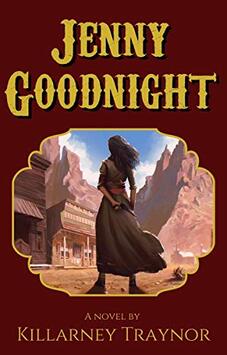 In case you hadn't already heard, I have 2 exciting announcements! One is that my latest book, Jenny Goodnight is available no for pre-order in paperback and on Amazon Kindle! And the second is the Live On-Air Book Fair, produced through the Early Late Night Live Show, that Peggy and I will be a part of on July 16th, 7pm, on YouTube and on the ELNL Facebook page! Over 12 authors, dozens of books, and tons of fun, so don't miss it! Check out the official video below! Writing Exercise: The Silver Ladle (a pirate adventure with Frantiesco Patrick Dias Evaristo)4/20/2020 Frantiesco Patrick Dias Evaristo has one of the best names ever. When I learned that he speaks fluent Portuguese and was volunteering to be a subject of my writing exercises, I immediately thought of Rafael Sabbatini's novels of swashbuckling adventure. In real life, Frantiesco is a talent actor and family man, and therefore unlikely to be prowling the seven seas in search of treasure and glory... but then again, you never know. :) 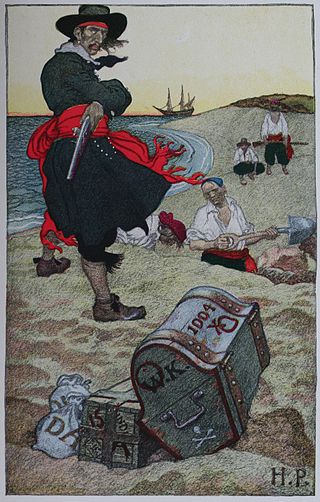 Of all the dives in Tortuga, the Silver Ladle had to be the lowest. Its low, heavily timbered ceilings resonated with the sound of raucous laughter and the jibbing of gambling men. And yet it was here that they found the man they were looking for. Frantiesco Dias Evaristo would have happily challenged anyone who called him a pirate. He was, as he avowed, a privateer, a buccaneer, if that made things clearer to his audience, and proudly boasted that he had the fastest ship and the most loyal crew, a claim that held up under scrutiny. He was a big man, with a dangerous charming smile, and a deceptively quiet manner. He spoke Portuguese and English like a native and listened quietly as Jonathan explained the situation to him. Only when the story was finished, did the buccaneer speak. “So, Captain Levasseur kidnapped your sister and you would hire me and my crew to rescue her,” Dias said, slowly, deliberately. He had a tall tankard of rum and a small ornate dagger, which he played with as he spoke. “Why wouldn’t you pay the ransom demand to Levasseur?” “I don’t reward pirates or kidnappers,” Jonathan said, nervously rubbing his hands together. “And I was told that you had a history with this Levasseur.” Dias smiled, a dangerous smile. “Oh, yes,” he said. “I have some unfinished business with Levasseur. I even learned a few choice words in French for the day I should meet him again.” He stood, took the dagger by the point and threw it, scoring a bullseye in the dart board across the room. Then he turned, smiling broadly at Jonathan and his companion. “Very well, sir, I accept your commission. We sail at dawn. And I promise you, senhor: we will get your sister back.” |
The BlogWelcome to Categories
All
|
Copyright © Killarney Traynor
All Rights Reserved.
No part of this website may be reproduced without
the Owner's express consent. [Backlinks allowed.]
All Rights Reserved.
No part of this website may be reproduced without
the Owner's express consent. [Backlinks allowed.]

